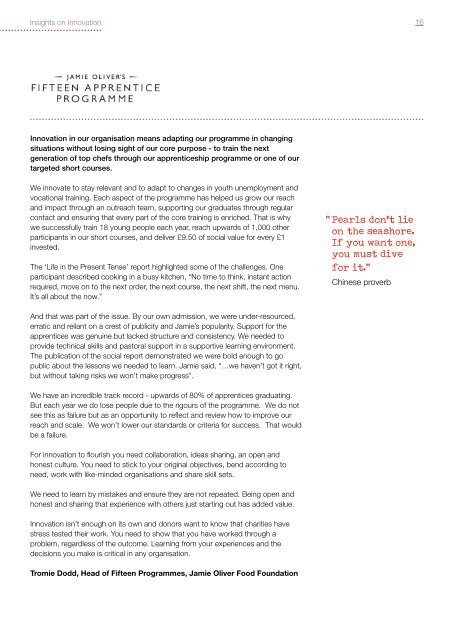O0YQ5
O0YQ5
O0YQ5
You also want an ePaper? Increase the reach of your titles
YUMPU automatically turns print PDFs into web optimized ePapers that Google loves.
Insights on Innovation<br />
16<br />
Innovation in our organisation means adapting our programme in changing<br />
situations without losing sight of our core purpose - to train the next<br />
generation of top chefs through our apprenticeship programme or one of our<br />
targeted short courses.<br />
We innovate to stay relevant and to adapt to changes in youth unemployment and<br />
vocational training. Each aspect of the programme has helped us grow our reach<br />
and impact through an outreach team, supporting our graduates through regular<br />
contact and ensuring that every part of the core training is enriched. That is why<br />
we successfully train 18 young people each year, reach upwards of 1,000 other<br />
participants in our short courses, and deliver £9.50 of social value for every £1<br />
invested.<br />
The ‘Life in the Present Tense’ report highlighted some of the challenges. One<br />
participant described cooking in a busy kitchen, “No time to think, instant action<br />
required, move on to the next order, the next course, the next shift, the next menu.<br />
It’s all about the now.”<br />
" Pearls don't lie<br />
on the seashore.<br />
If you want one,<br />
you must dive<br />
for it."<br />
Chinese proverb<br />
And that was part of the issue. By our own admission, we were under-resourced,<br />
erratic and reliant on a crest of publicity and Jamie’s popularity. Support for the<br />
apprentices was genuine but lacked structure and consistency. We needed to<br />
provide technical skills and pastoral support in a supportive learning environment.<br />
The publication of the social report demonstrated we were bold enough to go<br />
public about the lessons we needed to learn. Jamie said, “…we haven’t got it right,<br />
but without taking risks we won’t make progress”.<br />
We have an incredible track record - upwards of 80% of apprentices graduating.<br />
But each year we do lose people due to the rigours of the programme. We do not<br />
see this as failure but as an opportunity to reflect and review how to improve our<br />
reach and scale. We won’t lower our standards or criteria for success. That would<br />
be a failure.<br />
For innovation to flourish you need collaboration, ideas sharing, an open and<br />
honest culture. You need to stick to your original objectives, bend according to<br />
need, work with like-minded organisations and share skill sets.<br />
We need to learn by mistakes and ensure they are not repeated. Being open and<br />
honest and sharing that experience with others just starting out has added value.<br />
Innovation isn’t enough on its own and donors want to know that charities have<br />
stress tested their work. You need to show that you have worked through a<br />
problem, regardless of the outcome. Learning from your experiences and the<br />
decisions you make is critical in any organisation.<br />
Tromie Dodd, Head of Fifteen Programmes, Jamie Oliver Food Foundation


